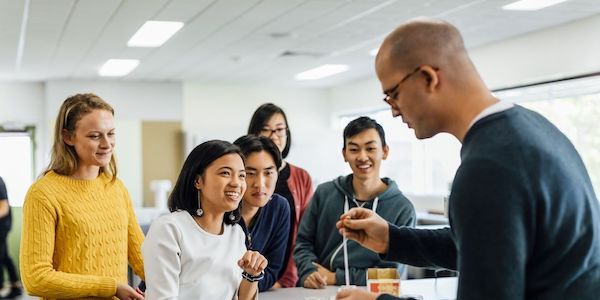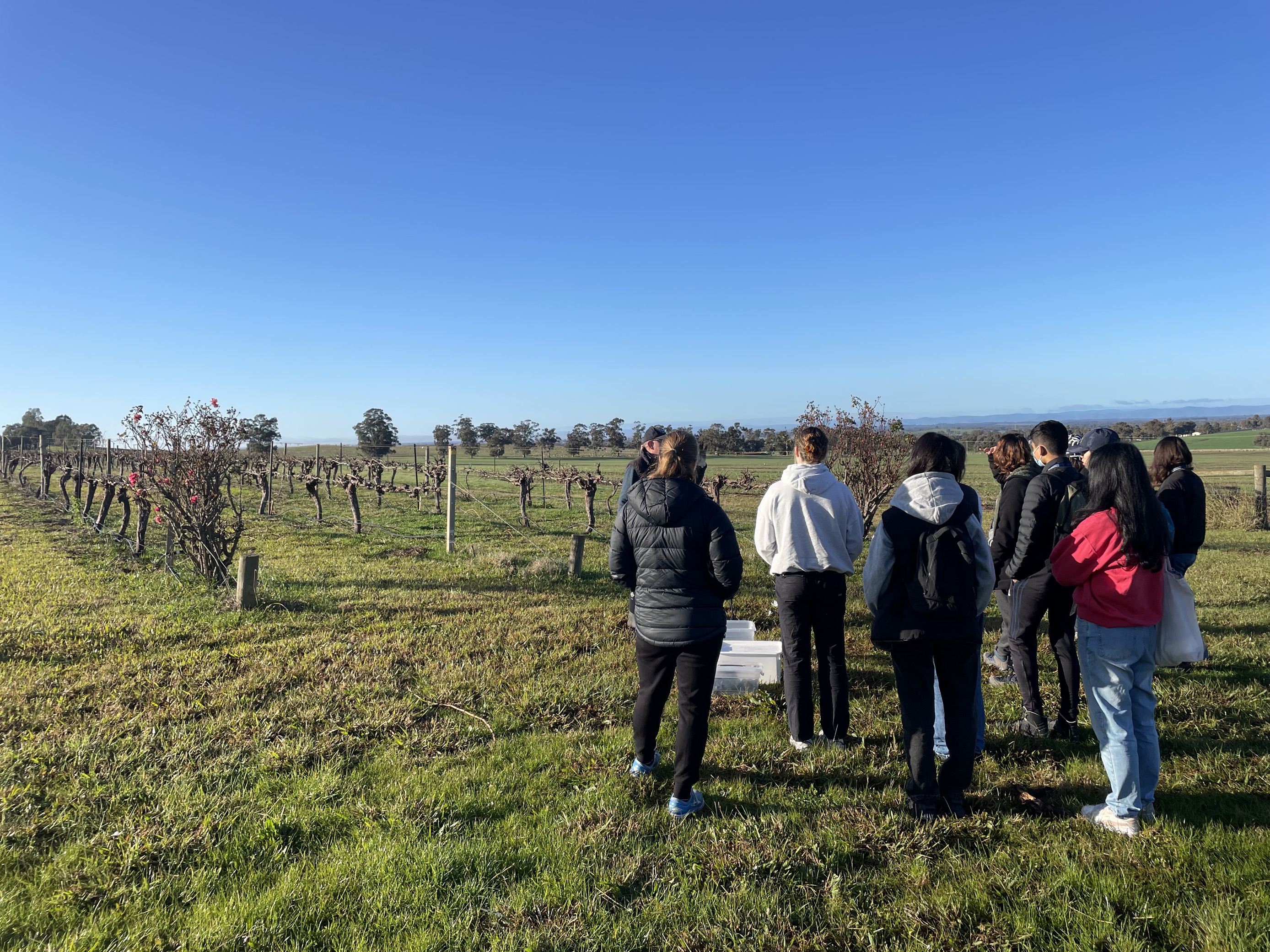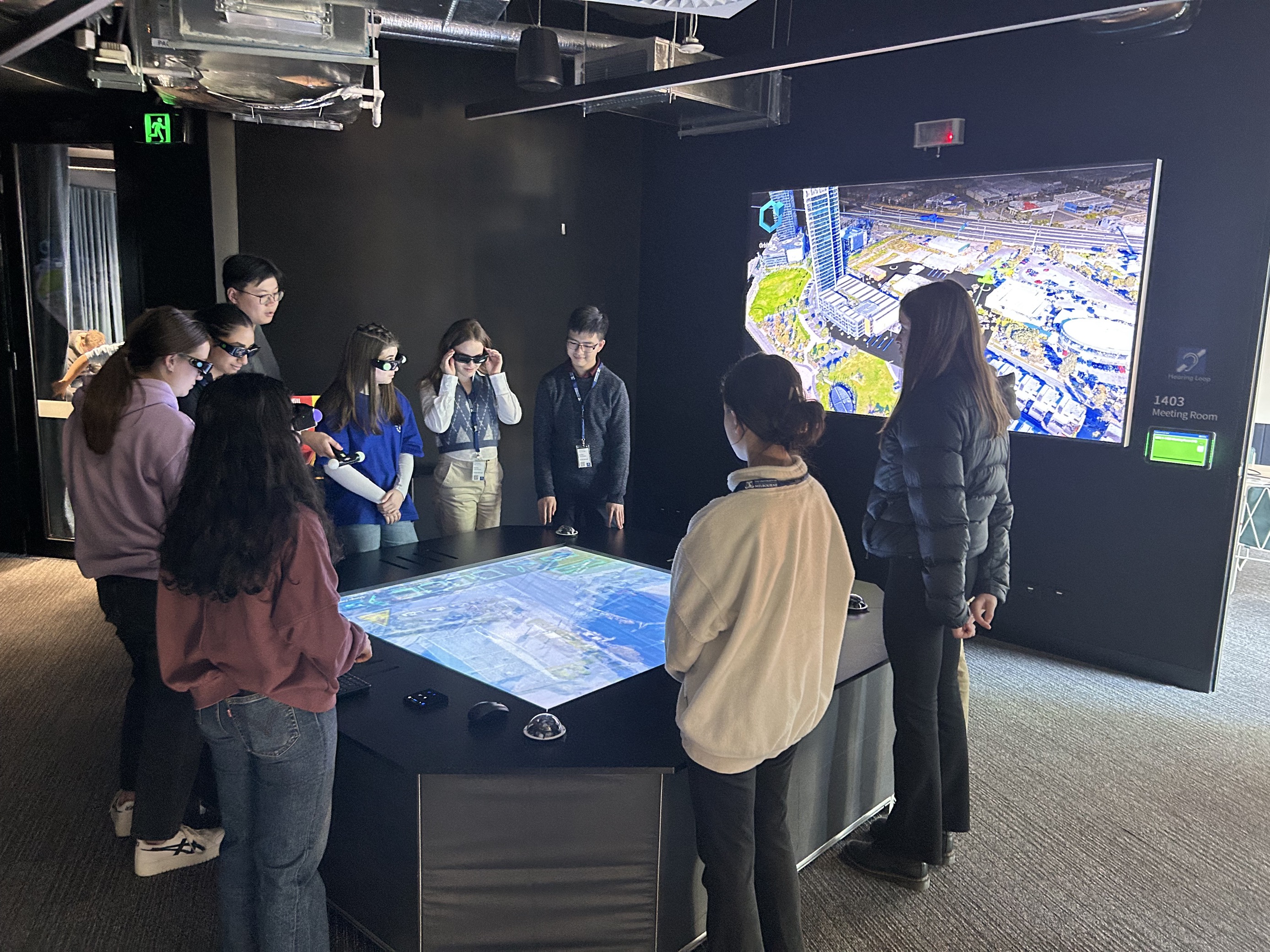Work experience in 2024
2024 Dates
Monday 24 - Friday 28 June.
(the last week of Term 2).
Program Structure
The University of Melbourne Year 10 Work Experience Program provides students with a sample of activities that are part of a career in STEM including conducting experiments, attending seminars, collaborating with others on research projects, and presenting their own findings.
Participants discover what it is like to be a scientist, meet like-minded friends and scientific role models, and also get a taste of university life.
The program is divided into a number of science discipline streams. Students must nominate their top three preferences as part of the application process. During the week, students will be hosted by academics working in their chosen discipline, and also spend some time interacting with students from other groups.

2024 Program streams
-
Agriculture, Food and Ecosystem Sciences (SAFES)
The School of Agriculture, Food and Ecosystem Sciences (SAFES) brings together a variety of discipline strengths and innovative solutions in ecosystem processes and management, food industries and systems, and agricultural practices and industry. This work experience opportunity covers an exciting mix of research covering topics that address a wide range of issues including climate change, food security, biodiversity conservation, sustainable forest management, invasive species, and environmentally and economically sustainable agricultural practices. Opportunities are available at the Parkville campus, as well as the schools’ other campus’ including Burnley, home of the urban horticulture and greening, Creswick, forests and fire, and Dookie, agriculture and land management across the themes of Agriculture, Food and Ecosystems. If you are keen on the environment, agriculture, and learning how research is making a difference to the ecosystems around us, then this could be the experience for you!
-
Biosciences
Research in the School of BioSciences is diverse and exciting. We use fundamental principles in ecology, evolution and genetics to understand how life on earth works, and to solve some of the most complex challenges humanity is facing. There is a broad range of techniques and questions that you’ll be able to learn about, such as how we can use evolution to control of invasive species, how ecology can be used by fisheries, the development of bioinspired materials to improve technologies and how animals can rapidly adapt to climate change. During your visit you will be able to interact with top researchers in these fields and be part of the process of doing science!
-
Chemistry
Chemistry is the study of matter – the structure, properties, and behaviour of everything that takes up space in the universe! If you choose to work in the School of Chemistry, you could be working in a lab investigating functional materials, biological chemistry or chemical biology, sustainability and the environment, and fundamental chemistry! Let us know which one you would be most interested in, and why!
-
Engineering
How did humans build sustainable and innovative communities that spread worldwide? Engineering includes the study of the natural environment, transport, machines, buildings, and even humans. It strives to improve the structures that society is established on in ways that benefit both humans and the planet.
-
Geography, Earth and Atmospheric Sciences (SGEAS)
People, Rocks, Fossils, Landscapes, Climate and Weather! We study Earth’s physical and chemical properties, fossils and the origins and history of life, the environmental and human effects of natural disasters, the distributions of minerals and resources needed to sustain our future planet, the dynamism of Indigenous cultures and landscapes, the drivers and trajectories of climate change, and the dynamics of human behaviour. This program will cover diverse topics, from earthquakes and volcanoes, to climate change, to engineering geology, to the diversity of human behaviours and cultures!
-
Information Technology (IT)
IT is a rapidly moving field that explores the way we manage and store data. The flow of information across the world has become crucial for businesses, governments, and individuals. It is expanding human society to an entirely different platform, as more of our world goes online.
-
Mathematics and Statistics
Originally, mathematicians engaged in pure mathematics – mathematics for its own sake, without having any application in mind. Today, however, almost all practical applications begin with mathematical foundations. Regarded as the root of all sciences, mathematics and statistics is essential to industry and research across many sectors such as healthcare, education, finance, energy, and supply chain. Mathematics and statistics also underpin the growing field of data science; they form the foundations for areas such as modelling, big data, machine learning, and artificial intelligence. We need mathematicians and statisticians, now more than ever, to tackle serious problems faced around the globe, concerning all facets of life at the microscale (e.g. bioinformatics) and macroscale (e.g. climate change).
-
Physics
Physics involves the study of everything in physical existence, from the smallest subatomic particles to the entire universe. If you choose to do work experience in Physics, you could work alongside astrophysicists investigating dark matter and new galaxies, or work in a lab developing methods to enable nanoscale imaging of biology and analysis of the inner composition of an atom.
-
Science Gallery Melbourne (SGM)
Science Gallery Melbourne (SGM) is a new space where science, art and technology collide, and young people are able to explore ideas and issues important to them. Part gallery, part museum and part experiment, Science Gallery exhibitions are developed with and for young people. Exhibition themes cut across STEM disciplines, and range from mental wellbeing, to swarming robotics, to dark matter. During your work experience, you will work with curators, learning programmers, exhibition designers and builders, and our in-house science communicators, Mediators, to gain insight into a variety of careers and learn how this transdisciplinary team works together to co-create future-focused exhibitions. It’s going to be a whole lot of fun!
Frequently Asked Questions
-
Who can apply?
All Year 10 Students currently studying in Australia (including homeschooled students) who will be 15 at the start of the program may apply.
-
How long is the program?
The Year 10 Work Experience Program will run for 5 full-days including at least 4 days of hands-on STEM work experience.
-
What will you do?
There is a huge range of activities students may undertake during their work experience including shadowing a STEM professional, conducting experiments/research, attending workshops/lectures/tutorials, and attending site visits. Students will also research a topic/question throughout the week and present their findings in a poster expo on the final day.
-
How much does it cost to attend the program & how much will you be paid?
The program is free to attend and all students will be paid at the Victorian Government standard rate of $5/day. While the program is free, students may apply for financial assistance to attend the program (e.g accommodation or travel costs) through the application form.
-
When are application outcomes released?
All students will be notified of their application outcome by mid-late March.
-
I accidentally entered the wrong information on my application, what should I do?
If you missed a question/answer or input the wrong information, please resubmit a NEW application and we will use the most recent application under your name.
-
Can I do my placement on different dates than those advertised?
Unfortunately, the Year 10 Work Experience Program only occurs once per year, and students must attend the dates outlined above.
-
I missed the application deadline, can I still apply?
Unfortunately, as the program is highly competitive with around 1,000 applicants each year, we cannot accept late applications. However, we do offer other STEM programs that may be of interest which can be found here: https://science.unimelb.edu.au/engage/science-in-schools
How to apply for the 2024 program
Applications for the 2024 program are now CLOSED.
Financial assistance is available to attend the program and will be assessed on a case-by-case basis. To be assessed, applicants must complete the appropriate section on their application.
For all other enquiries please send an email to science-workexperience@unimelb.edu.au.
Click here for information about vaccination requirements for visitors to the university.
Other events you might be interested in
Are you interested in studying at the University of Melbourne? Hear directly from our staff and students at one of our many in-person and online events, or find out more about events we could run in your school






